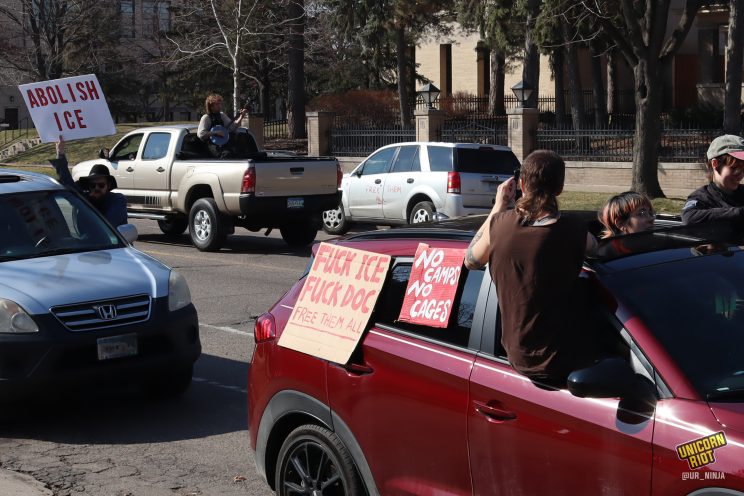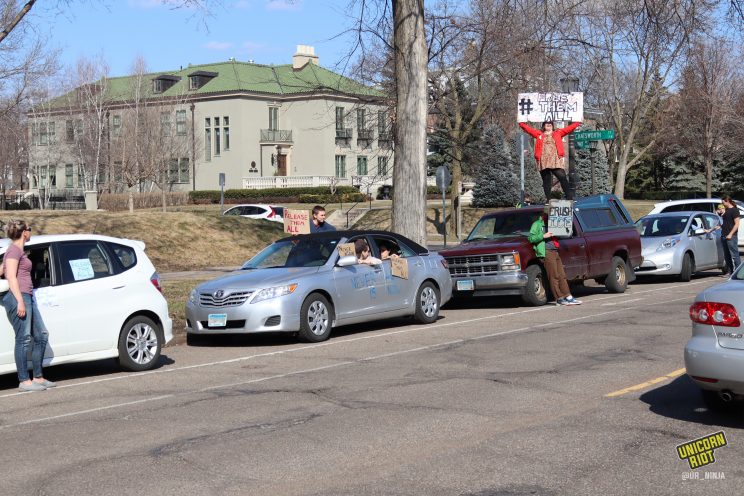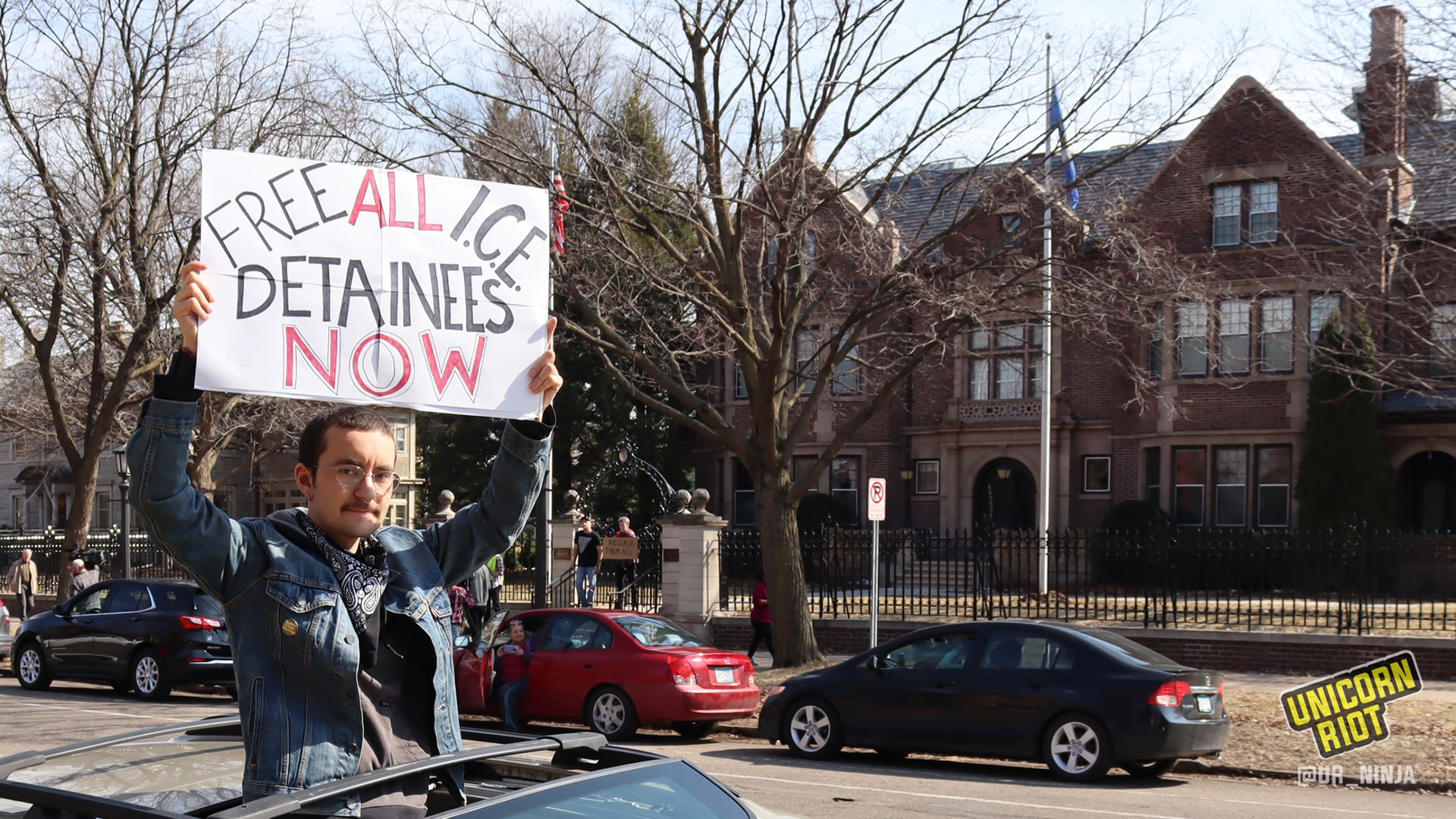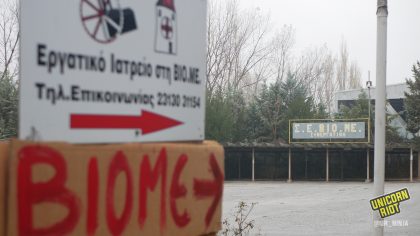‘Never Again’ Demo Demands Release of Detainees Amidst COVID–19 Pandemic
St. Paul, MN – As the coronavirus continues to spread, activists in Minnesota are speaking out for the safety of those behind bars. On Friday, March 27, hours before a Stay at Home order was to go into effect, over 100 protesters held a socially distant car sit-in demonstration calling for the release of detainees to prevent COVID–19 from spreading to ill-equipped jails, prisons, and detention centers.
Organized by a coalition of community groups in the Twin Cities, the demo called for the immediate release of all detainees, specifically those in ICE detention centers, those on work release, the medically vulnerable, those with no criminal record, and those who were incarcerated due to technical violations.
Locally the demo was the second car sit-in and third collective action in the past week demanding the release of detainees to protect them from the ongoing pandemic.

At Friday’s action, a petition with over 800 signatures was delivered to Minnesota’s Governor, Tim Walz, who’s been in self-quarantine for the last week after his bodyguard tested positive for coronavirus.
The petition, titled No One Should Be Sentenced to Die From Coronavirus – Emergency Recommendations for MN’s Incarcerated, asked Governor Walz, Corrections Commissioner Schnell, ICE Field Director, Heath Commissioner Malcolm, and the Sheriffs and Attorneys of each Minnesota County to “prioritize the most vulnerable, with the least access to quality medical care“.
The petition gave five recommendations (below) based on Prison Policy Initiative’s interventions to help the criminal justice system slow the coronavirus pandemic:
- Immediately release, or transfer to community supervision, incarcerated people at highest risk of death and least risk to the public.
- Immediate moratorium on arresting or incarcerating people with low risk to others, and change policies that unnecessarily expand incarceration.
- Increase medical staff in prisons and jails; end medical co-pays; provide increased, unrestricted, frequent access to hygiene; testing; and end practices that increase transmission, including double-bunking, abusive lockdowns, and forcing people to work.
- ICE and CBP out of hospitals.
- Make phone, video, and email communications free via functional technology.
The petition was signed by the following groups: Decarcerate MN Coalition, Twin Cities Incarcerated Workers Organizing Committee, NAACP Mpls, Jewish Community Action, Communities United Against Police Brutality, Release MN8, MN Freedom Fund, Minneapolis Black and Pink, Women’s Prison Book Project, No Cages MN, Human Impact Partners, MN Immigrant Movement, ICOM – Interfaith Coalition on Immigration, and the Twin Cities Democratic Socialists of America.

Many carceral institutions across the world have seen infections and rumors of infections leading to mass protests, hunger strikes, riots, and escapes.
As the U.S. tops the world in the number of incarcerated people, it also tops the world in coronavirus cases. In turn, infections in correctional institutions are on the rise, with at least 350 cases in the U.S.
Jails across New York City and Chicago’s Cook County Jail are rife with infection. Inmates are left unprotected due to facilities not following the guide to manage coronavirus in correctional facilities put together by the Centers for Disease Control and Prevention.
The amount of infections in New York City jails is 87 times higher than the whole of the country. 132 detainees in New York City jails are reported to have tested positive of coronavirus, while 104 staffers are said to have the virus.
Meanwhile, Cook County has built a quarantine camp to house the rising number of infected, which was at 89 inmates and nine staff testing positive on Saturday.
As the pandemic spreads across the globe, an independent journalist project, COVID–19 Behind Bars, maps out where the virus has impacted incarcerated populations (see below).
Riots and jailbreaks spiked in March throughout the country and the world with detainees fearful of dying in jail.
In Yakima, Washington, 14 inmates escaped after a riot; many claimed their fear of coronavirus led to them participating and escaping. All 14 have since been caught.
Nine women in South Dakota escaped from the Pierre Community Work Center, fearing the virus after another inmate tested positive — two are still on the run.
Internationally-reported jailbreaks and riots have occurred in Italy, which at the moment is the epicenter of the pandemic. Further jailbreaks have happened in Chad, while deadly rioting has been reported in Thailand, Colombia, and Jordan.
Some countries such as Iran and Ethiopia have released thousands of prisoners, while other countries like South Africa, India, and Jordan have been arresting people in their country-wide lockdowns to combat the pandemic.
The effects of COVID–19 are only beginning to be seen, felt, and assessed. For the vulnerable ones in society this pandemic hits the hardest. In a positive light, there remains people supporting the most vulnerable with advocacy as seen in the Never Again car sit-in demo and with acts of mutual aid.
[UPDATE | March 30 – 4:40 p.m. CST] Minnesota has recorded its first positive cases of coronavirus infections in its prisons. A corrections officer at MCF-RW, Minnesota’s juvenile prison, has tested positive and an adult inmate at Moose Lake prison has also tested positive. Department of Corrections (DOC) Commissioner Schnell released a statement saying they are taking steps to minimized the spread. Minnesota’s DOC website has updates on COVID–19 tests.
Unicorn Riot's COVID–19 Coverage:

- “Brazil is Asking for Help” – Artists and Activists Speak Out - April 10, 2021
- Brazilian Pandemonium: COVID-19 Kills Over 300K - March 27, 2021
- COVID-19 Deaths in Minnesota Prisons Continue to Rise - February 17, 2021
- Brazil Nears 200K Deaths as Politicians Continue to Downplay COVID-19 - December 20, 2020
- Winter of Coronavirus: Seeking Shelter in Minneapolis During COVID–19 - December 14, 2020
- Denver Sweeps 300+ Tent Encampment Residents - November 30, 2020
- Unhoused Community Forms Tenants Union, Constituents Protest at Commissioner’s Home - November 11, 2020
- Minneapolis Prioritizing Park Sweeps Over Sheltering the Unhoused - October 29, 2020
- Court Protest Aims at Boston Covid Housing Crisis - October 29, 2020
- Philly Starbucks Worker Delivers NLRB Unfair Labor Practice Complaint - October 15, 2020
- Demands Reignite for Releases from GEO ICE Jail Amid New Covid Outbreak - October 5, 2020
- Peavey Park Sanctuary Homeless Camp Evicted in Minneapolis - September 24, 2020
- New Month Brings Added Urgency To Minneapolis’ Housing Needs - September 2, 2020
- COVID–19 Testing DeMystified at Community-Informed Coronavirus Testing Site - August 29, 2020
- Sanctuary Camp Residents Pressured to Move, No Housing Solution In Sight - August 22, 2020
- Coronavirus, Corruption, and Resistance: Life Under South Africa’s Lockdown - August 17, 2020
- Authorities Visit Loring Park Tent Encampment, Bring Eviction Scare - August 10, 2020
- Minneapolis Park Police Displace Sanctuary Encampment - July 22, 2020
- Homeless Philadelphians Moving Into Vacant City-Owned Homes - June 22, 2020
- Encampment to ‘Free Them All’ Outside GEO ICE Detention Center - May 26, 2020
- The Coronavirus Crisis in Brazil – An Interview with EmiciThug - May 22, 2020
- Nurses Picket Over Lack of Protection From Ongoing Viral Pandemic - May 21, 2020
- Mutual Aid to Detained Refugee Women Grows — Coronavirus in Greece Part 3 - May 7, 2020
- Minneapolis May Day Protest Supports Essential Workers - May 2, 2020
- MN Demonstrations, Demands to Free Prisoners Escalate - April 30, 2020
- Denver ‘Clean-ups’ Displace 100+ Unhoused Residents Amid Health Crisis - April 30, 2020
- Worker-Occupied Factory Sends Soap to Refugee Camp – Coronavirus in Greece, Part 2 - April 28, 2020
- A Country Quarantined, Coronavirus in Greece Part 1 - April 25, 2020
- Who’s Calling to ‘Liberate Minnesota’, and Why? - April 21, 2020
- Living with COVID–19 - April 17, 2020
- Philly Mayor and Judges Pressured To Release Inmates From Jail - April 15, 2020
- Calls for Rent and Mortgage Freeze Outside MN Legislature - April 14, 2020
- What Is Coronavirus and How Do Humans Defeat It? - April 10, 2020
- Car Protest Demands Philadelphia Officials Release Prisoners To Save Lives In Pandemic Crisis - April 10, 2020
- ‘Cancel Rent’ Demo Calls for a Rent and Mortgage Payment Freeze as COVID-19 Spreads - April 9, 2020
- Coronavirus in the Caribbean: COVID–19 Update from Puerto Rico - April 2, 2020
- ‘Never Again’ Demo Demands Release of Detainees Amidst COVID–19 Pandemic - March 30, 2020
- South Africa Under Lockdown as COVID–19 Spreads - March 29, 2020
- Providing Mutual Aid Amidst the Coronavirus Pandemic in Minnesota’s Twin Cities - March 27, 2020
- As U.S. Coronavirus Cases Top the World Charts, Minnesotans’ “Stay at Home” Order Goes Into Effect - March 27, 2020
- “Everyone Deserves A Cost-Of-Living Adjustment”: Interview with UCSC Striker Yulia Gilich - March 26, 2020
- ‘Real boog hours’: Neo-Nazi Terror and the Coronavirus Crisis - March 20, 2020
- Coronavirus Concerns End St. Paul Educators Strike, Close Many Public Schools - March 14, 2020
Please consider a tax-deductible donation to help sustain our horizontally-organized, non-profit media organization:



